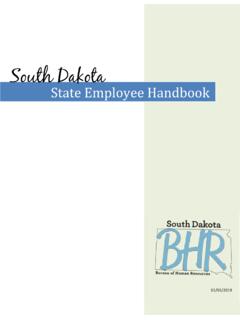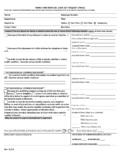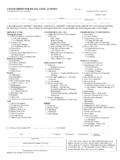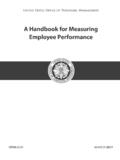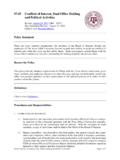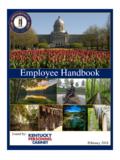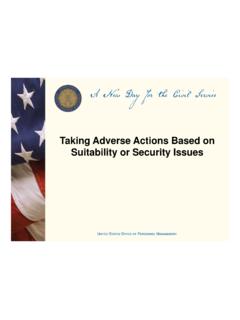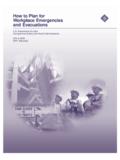Transcription of State Employee Handbook - South Dakota
1 South Dakota State Employee Handbook 01/01/2019 Table of Contents Handbook Disclaimer .. 3 A Message from Governor Noem .. 4 Personal Responsibility Basics .. 5 Policy on Acceptance of Gratuities, Rebates, Reward Points & Other Perquisites by State Employees .. 6 Anti-Harassment/Discrimination Policy .. 6 Conflict of Interest Laws .. 8 Fraud or theft in the work place .. 10 Reporting Wrongdoing and Anti-Retaliation Policy .. 11 Outside Employment .. 12 Political Activity .. 12 Disciplinary Action .. 12 Technology Use Policy .. 13 Executive Branch Agencies .. 15 Equal Employment Opportunity .. 18 Types of Positions .. 18 Leaves of Absence .. 19 Employee /Manager Service Center .. 24 Compensation .. 25 Health, Life, and Flexible Benefits .. 26 beneFIT Well-Being 29 Preventive Care & Assistance.
2 30 Employee Responsibilities .. 31 Job Announcements .. 32 Classification System .. 33 Training .. 33 Accountability and Competency Evaluation System (ACES) .. 33 Resignation and Retirement .. 33 Appeals and Grievances .. 34 Policies .. 34 Arrest Policy .. 37 Bomb Threat Policy .. 37 Break Periods for Employees .. 39 Court and Jury Leave Policy .. 39 Drug and Alcohol Testing Policy .. 40 Drug and Alcohol Free Workplace Policy .. 40 General Reference Policy .. 41 Seat Belt Policy .. 42 Solicitations on State Premises .. 42 State Employee Bloodborne Pathogen Procedures - Short Guide .. 43 Tobacco Free Environment Policy .. 44 Use of Sick Leave for the Birth or Adoption of a Child .. 44 Use of Video, Recording Devices or Still Cameras by State Employees in the Workplace.
3 45 Workplace Safety Policy .. 46 Risk Management .. 46 Handbook Disclaimer This Handbook is intended to provide general information to State employees. The policies and information described in this Handbook are not conditions of employment, and the language is not intended to, nor does it, create a contract between the State and the Employee . The State reserves the right to change or eliminate any of the policies or information in this manual at its discretion with or without notice. Also, some of the statements in this Handbook are general in nature and should not be read as including all the details on the subject discussed. The State reserves the right to discipline status employees in accordance with the State laws and rules and to discipline all other employees (who are at-will employees) at any time and for any reason.
4 Any Employee Handbook or manuals previously distributed by the Bureau of Human Resources are revoked and rescinded, and the provisions are null and void. This Handbook is not an exhaustive list of all Employee obligations. In addition to the Handbook , employees must also abide by federal and State laws, regulations, and administrative rules as well as other statewide and internal agency orders, policies, guidelines, directives, and instructions. If you have questions about the Employee Handbook or this disclaimer, please contact your human resource representative. The State of South Dakota Employee Handbook is updated regularly by the Bureau of Human Resources. To receive or review a current copy of the Handbook , please contact your human resource representative at the Bureau of Human Resources or access the Handbook on the Bureau of Human Resources intranet website.
5 Personal Responsibility Basics Accepting Gratuities, Rebates, Reward Points and Other Perquisites - State employees shall not accept gratuities, money, or any type of gift or service from a company that does business or that actively aspires to do business with the State in exchange for recommending or influencing the award of or the terms of a contract with the State . State employees shall not accumulate reward points or receive rebates, from any source, related to the purchase of goods or services from any vendor to be redeemed for personal use. Incidental benefits like frequent flier miles or lodging reward points accumulated for State -sponsored travel are allowed. Anti-Harassment/Discrimination Policy - Harassment, discrimination or offensive behavior based on race, color, religion, national origin, sex, age, genetic info, disability or other legally protected status or characteristic will not be tolerated.
6 An Employee who has a complaint of harassment, discriminatory or offensive behavior by a supervisor, co-worker, or non- Employee , should immediately notify his or her supervisor, a higher-level supervisor, the agency's human resource manager, or BHR s EEO officer at (605) 773-4918. Conflict of Interest - Laws apply to State employees and officers who recommend approval, approve, award or administer contracts or supervise someone who does and would derive a direct benefit from a contract. Deriving a direct benefit means the Employee or officer or others with whom the person lives and commingles or has combined assets cannot: receive a benefit from a contract that is withinthat person s scope of duties while in office derive contract benefit for a year after leavingoffice enter into a contract with any State agency,except an employment contract, for a year afterleaving officeA waiver process exists for employees and officers.
7 Outside Employment -You may have outside employment provided that, in the opinion of your supervisor, there is not a conflict with your working hours, your work efficiency, or with the interests of State government. You must check with your supervisor before accepting other employment. Use of Technology Employees may not use State technology to engage in outside business interests, inappropriate, offensive or illegal activities. Employees should not expect privacy or confidentiality when using State resources. Disciplinary Action- Disciplinary action may include suspension without pay, reduction in salary, demotion, or termination. Just cause for disciplinary action includes, but is not limited to: violating statutes, rules, policy, directives, and workrules; sex offense, any crime involving illegal drugs, or a felony; insubordination; disrupting the efficiency or morale of the department; being under the influence of a controlled drug or alcoholat work; misuse or abuse of leave; engaging in outside or personal activities on State time,or using State property for non-government purposes; conduct reflecting unfavorably on State , destroysconfidence in operations of services, or adversely affectspublic trust; negligence with State money or property; poor attendance; and discrimination and harassment.
8 Political Activity State resources may not be utilized to influence the nomination or election of a candidate or the adoption or defeat of any ballot question. Civil service employees are not allowed to use official authority to influence or coerce political action by a person or group. Participation in campaigns or political management is allowed outside of work hours. Workplace Fraud or Theft State Laws and Administrative Rules establish control and aid in the prevention and detection of fraud against State property and apply to any actual or suspected Employee fraud or theft. These laws include prohibition of the following: salaried officers retaining money received by theft dual salaries for State employees (limited exceptions) dual compensation for State duties outside employment without proper approval negligence with money or other State property belongingto anyone receiving services from the State attempt to steal or stealing from anyone receiving servicesfrom the State Employees who suspect fraud, theft should report it to theirsupervisor or the attorney general s office report potential violations of these policies to your supervisor, department's internal control officer or human resource manager.
9 Pg. 6 State of South Dakota Employee Handbook January 2019 Policy on Acceptance of Gratuities, Rebates, Reward Points & Other Perquisites by State Employees This policy prohibits the acceptance of personal gratuities, rebates, reward points and perquisites by State government employees in the performance of their duties. REQUIREMENTS employees shall not accept gratuities, money, or any type of gift or service from acompany that does business or that actively aspires to do business with the State of SouthDakota in exchange for recommending or influencing the award of or the terms of a contractwith the State (See SDCL 3-16-8) vendor program offering rebates or award points to the State of South Dakota related tothe purchase of goods and services must be reviewed and approved by the Bureau ofAdministration.
10 Rebate payments and award program points must be made payable to the State of South Dakota , or otherwise as determined by the Commissioner of the Bureau ofAdministration. Rewards offered to a State officer or Employee for purchasing supplies orservices for the agency could reasonably be viewed as a means of influencing or rewarding theState officer or Employee in how he or she carries out his or her official duties for the these circumstances, such rewards would constitute gifts that influence or reward aState officer or Employee for his or her official actions. Therefore, the redemption of theserewards by a State Employee eligible to receive them as a result of his or her responsibilities onbehalf of the State agency would violate this policy and State law.
